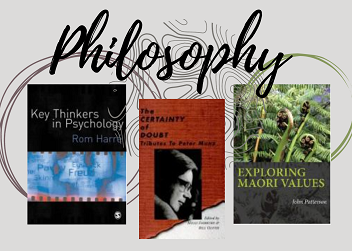Celebrate World Philosophy Day with philosophy in New Zealand; from the famous argument of Sir Karl Popper to the traditions of Mātauranga Māori, plus some key thinkers such as Rom Harré and Peter Munze.
Beyond Wittgenstein’s poker : new light on Popper and Wittgenstein / Munz, Peter
“World renowned philosopher Sir Karl Popper worked in New Zealand in 1930-40s. In 1946, Ludwig Wittgenstein, the chair of Cambridge University Moral Science Club invited Popper to present a paper. The discussion turned into an argument, and Wittgenstein used a fireplace poker to emphasize his points. Then Popper replied that an example of a moral rule is `Not to threaten visiting lecturers with pokers′.” (Librarian’s review)
Key thinkers in psychology / Harré, Rom
“Book is written by New Zealand British philosopher Rom Harré. As recommended by The Psychologist `For anyone that has spent years rowing off into convoluted estuaries, and would like an entertaining and useful chart to remind them of River Psychology as a whole, I thoroughly recommend this book′ . This is a highly enjoyable, erudite and beautifully written manuscript. It conveys a rare depth of understanding and ability to strike at the core debates. ‘ – Dr Steve Brown, Loughborough University” (Adapted from Amazon.com)
Exploring Māori values / Patterson, John
“This book, first published in 1992, offers Pakeha New Zealanders an insight into Maori thought and values and the basis for the sort of understanding and partnership that should exist between Pakeha and Maori. It also presents a new perspective from which long-held Pakeha values can be reassessed. He demonstrates a high degree of empathy with and respect for Maori and the book offers a practical model for engagement with this culture and for greater mutual understanding. “(Adapted from the Catalogue)
The certainty of doubt : tributes to Peter Munz
“These essays are written by Peter Munz’s friends and colleagues to celebrate his 75th birthday. They write on broad themes, the philosophy of history and science and the problems of knowledge and in doing so they reflect the growth and breadth of Munz’s intellectual interests and achievements. These essays are major contributions to their fields, which range from 5th century monastic life to claims before the Waitangi Tribunal to the importance of evolutionary theory for history and philosophy.” (Adapted from the Catalogue)


